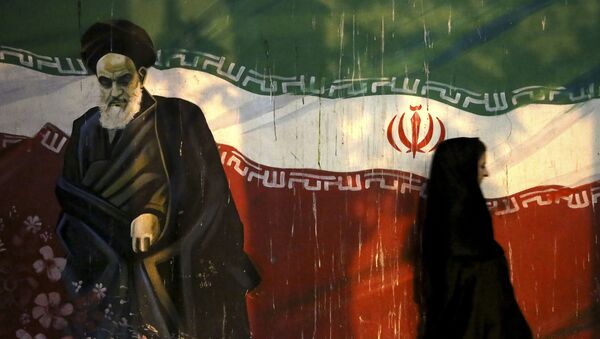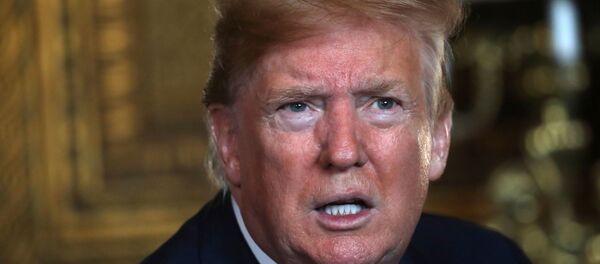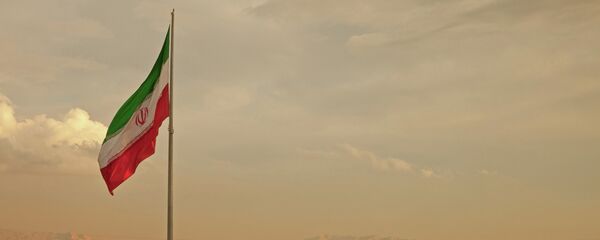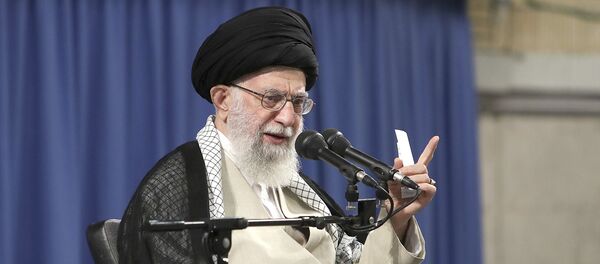The Iranian nuclear deal, formally known as the Joint Comprehensive Plan of Action (JCPOA), was painstakingly negotiated with Iran by the European Union, China, Germany, France, Russia, the United Kingdom and the United States — referred to collectively as E3/EU+3 — for roughly a year and eight months between 2014-2015. The consultations culminated in the agreement finally being signed on 14 July 2015. The accord stipulated that the previously-imposed sanctions on Iran would be gradually lifted in exchange for the country's concession to curb its nuclear program and allow inspections to ensure that its nature is peaceful.
Even before taking office in 2016, US President Donald Trump repeatedly signalled that he would eventually withdraw from the JCPOA, as well as several other agreements negotiated by previous administrations. On 8 May 2018, he followed through on his words and announced that Washington would be exiting from the deal, despite the fact that a UN nuclear watchdog's inspections had repeatedly confirmed that Iran had been adhering to its commitments.
Ever since, the US has pursued a "policy of maximum pressure" on Iran, which has included not only the reimposition of its previously lifted economic restrictions on Tehran and the countries with which it trades but also fresh rounds of sanctions on Iranian officials and companies.
Exactly one year following the US' withdrawal from the deal, Iran announced that it would gradually suspend its own commitments, ratcheting up further controversy between the two rivals and subsequently exacerbating tensions in the whole Middle Eastern region.
"If withdrawal from the nuclear deal by President Trump was meant to bring Tehran back to the negotiating table, the United States has failed … However, whether the so-called maximum pressure has affected Iran's economy — yes, it did, and it did badly", Dr Alam Saleh, a lecturer in Middle East politics at Lancaster University, said.
Rolling Back Previous Commitments
In announcing his intent to cut Tehran's obligations under the agreement, Iranian President Hassan Rouhani expressed his discontent with how the other parties to the deal had fulfilled their commitments.
"The other parties to the deal have failed to live up to their commitments, so Iran is left with no other choice but to reduce its commitments", Rouhani wrote in a letter to the leaders of the remaining parties in May of 2019.
He reassured his vis-à-vis that the move was not "the end of the deal", but gave Europe 60 days to ensure Iran's interests under the pact. Beginning then, Iran has been gradually rolling back its commitments to the 2015 nuclear accord every two months — to the dismay of the European nations, alas, without any significant progress in meeting Tehran's demands.
In early November, the country embarked on the fourth stage of curtailing its commitments and plans to enrich uranium up to 4.5 percent by injecting gas to 1,044 centrifuges at the Fordow nuclear facility.
Iran insists that all of its moves are in accordance with Article 36 of the accord, which describes the so-called dispute resolution mechanism. The mechanism enables a signatory to cease its commitments "in whole or in part" if an issue that it deems to be constituting "significant non-performance" remains unresolved as a result of the procedures outlined in the accord.
Failure of INSTEX
As the US waged its "maximum pressure" campaign against Iran, an array of major European enterprises, including France's Total oil giant, the Maersk logistics company, Germany's Siemens, the Airbus and Peugeot aircraft manufacturers, the Volkswagen and Peugeot car manufacturers, and many others, have suspended projects and drastically reduced their presence in the country. In May of 2019, the US ended sanctions waivers for importers of Iranian crude oil in what was another heavy blow to the economy of Iran — a country that was once one of the world's top oil exporters.
According to the International Monetary Fund (IMF) data, Iran's GDP plummeted by 4.8 percent in 2018 as a result of the US economic pressure. The IMF also projects that the country's GDP will decline by an additional 9.5 percent this year.
In striving to minimise the sanctions' economic impact, the European Union set up a trade system, known as the Instrument in Support of Trade Exchanges (INSTEX), in order to bypass the sanctions and continue trade with Iran. Following a meeting of the Joint Commission of the Iranian nuclear deal in June, the mechanism became operational and available to all EU member states.
However, Tehran has expressed its dissatisfaction in how the mechanism works, with the Foreign Ministry saying that it was not what Iran wanted.
One of the mechanism's most pressing issues is that it is limited to "humanitarian goods," such as food and medicines, and does not cover oil, which is Iran’s main commodity that, if it had been included, could have tangibly improved the economic situation in the country, according to Dr Guy Burton, a visiting fellow at the LSE Middle East Centre and adjunct professor of international relations at the Vesalius College in Brussels.
"Increasing the basket might help, but unless oil is included, it's probably not going to get a sufficient Iranian buy-in", he stated.
The expert suggested that apart from improving INSTEX, another option would be to send a tranche of aid to Iran, although it would be closer to humanitarian assistance rather than a solution to generate production and economic activity in the country.
"At the same time, that also has public image problems: given the recent protests which were quashed by the regime, do the Europeans want to be seen as rewarding that?" Burton underlined.
At the same time, no mechanism can force entrepreneurs to run business operations in Iran, as their primary focus is on making revenue rather than completing geopolitical goals, the expert noted.
"They have to factor in the risks of doing business there, which includes the fact that many of the larger, more internationalised firms are more exposed to global markets, and therefore, American sanctions", he explained.
Tensions in the Gulf
The standoff between the United States and Iran has ultimately ignited tensions in the already unstable Middle East, with a "war of words" coming close to a "war of weapons" several times in the Persian Gulf in 2019.
Most of the incidents, in one way or another, targeted the region's main commodity — oil. On 12 May, four commercial vessels, including two Saudi Arabian oil tankers, were attacked in the waters off the UAE's Fujairah. On 13 June, two oil tankers, Panama-flagged Kokuka Courageous and Marshall Islands-flagged Front Altair, were attacked near the Strait of Hormuz. While the causes of the incident remain unknown, the United States and its allies have blamed Iran, which has denied any involvement.
September drone attacks on the facilities of Saudi Arabia's state oil company, Saudi Aramco, further added fuel to the fire. Even though Yemen's Houthi movement has claimed responsibility for the attacks, the United States once again blamed Iran, as have France, Germany and the United Kingdom.
Washington subsequently called upon other countries to join a coalition that would ensure safe maritime passage through the strategic pathways of the Gulf utilising aerial surveillance and actual patrol ships. While several countries — such as Bahrain, Australia, Saudi Arabia, the United Arab Emirates and the United Kingdom — supported the US initiative, others insisted that they were capable of protecting their ships without the help of a coalition made up of third countries.
The United States has also sent more troops to the region amid the standoff with Iran. The Wall Street Journal reported in early December that Trump was expected to decide in a month whether to sign off on a plan to counter Tehran by sending an additional 14,000 servicemen, dozens of ships and other hardware to the region. A Pentagon official subsequently refuted media reports but did not rule out that the US could "adjust our force posture" amid the threat emanating from Iran.
Speaking on the wide-spread concerns that the simmering tensions in the Gulf might boil over into open conflict by mistake, Dr Saleh of Lancaster University stressed in his comments that all of the sides had carefully weighed and continued to weigh each step to prevent a war, which would benefit no one.
"All these measures are designed in a way — 'okay, we will increase the tension, however, we know the limits, we know the red lines, we know that there should be no casualties or anything like this' … I don't think that any of the sides are ready to go to any kind of war", the expert stressed.
Fading Hopes for Change of Heart
The eight months that followed Iran's announcement of reducing its nuclear-related commitments saw not only the aggravation of regional tensions, but also numerous diplomatic efforts to find a solution to the crisis, including by countries that are not directly involved in it, such as Japan. The Asian nation, which maintains good relations with Iran while also remaining a key US ally, has offered its mediation and hosted Iranian Foreign Minister Javad Zarif twice this year. Additionally, Japanese Prime Minister Shinzo Abe himself travelled to Iran in June.
The remaining parties to the 2015 nuclear accord, naturally, have also been trying to find ways to persuade Iran to stop suspending its obligations under the JCPOA. France, in particular, has been actively engaged in consultations with Iran's leadership. In a bid to salvage the deal, French President Emmanuel Macron proposed in September giving a $15 billion credit line to Iran in exchange for Tehran's return to adherence. The plan was discussed with Trump, who, according to media reports, viewed the idea positively.
According to Dr Saleh, Europe is too weak to become a game-changer despite certain attempts to improve the situation. He stated that only Tehran and Washington are capable of turning the tide, but there appears to be no immediate solution — for another year or so.
"I think it's just the two sides waiting for the other to compromise or for something to happen that would change the entire situation. In other words, Iran is waiting to see if Trump will be reelected or not, while the United States and Trump are waiting to see if this maximum pressure will ... convince Tehran to somehow agree with what Trump may want", the expert said.
He noted that if anything happens, it would be only after the United States' presidential elections next year.
However, Iranian Deputy Foreign Minister Seyed Abbas Araghchi warned in November that Tehran might soon simply run out of commitments under the deal to further scale back, which may see the agreement completely collapse months before the presidential election in the United States.
"If you cannot find a solution for the JCPOA and the current crisis that we are in in the coming months, I think we will soon reach the end of the JCPOA, even months before the US elections", the senior diplomat said at the Moscow Nonproliferation Conference.
While the collapse of the deal is certainly a possibility, it is "a trap that Iran is best advised to avoid", Professor Hassan Hakimian, the director of the Middle Eastern Studies Department at the Hamad Bin Khalifa University, stated.
"If that happens, that will be the perfect scenario for the hardliners within the US administration and those who opposed the JCPOA from its inception (including the regional players), who will rejoice at its final demise. This will be taken by them as the ultimate proof of Iran’s wish or aspirations to pursue a nuclear weapons program", Hakimian said.
The collapse of the JCPOA could have "drastic" repercussions, both regionally and globally, the expert warned.
"Iran risks losing the European — albeit too little and symbolic — support for the JCPOA and at the extreme, the Iran file could be referred back to the UNSC. This will set the clock back on regional and global diplomacy as far as the Iran nuclear negotiations are concerned. Multilateral sanctions could return and the drum-beating for another war will reach a new height in the US and among its closest regional allies", Hakimian said.






